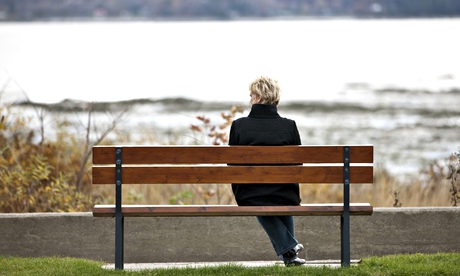Britain may well be 'Europe's loneliness capital', but being happily alone by choice is quite another matter

Isolated… or just enjoying her own company? Photograph: Pierre Desrosiers/Getty Images
There used to be a fashion for scaremongering surveys about single women, saying things like: "Eight out of 10 women are going to die alone, surrounded by 17 cats." But to that I would mentally add: "Or it could all go horribly wrong." To my mind, aloneness never necessarily equated with loneliness. It wasn't a negative, something to be avoided, feared or endured.
Now a survey from the Office for National Statistics says that "Britain is the loneliness capital of Europe". Overall, Britons are less likely to have people they can turn to in a crisis or to feel close to neighbours. On this last point, we came 26th out of 28 European countries – beating Denmark and France (but they scored higher in other areas).
However, Britain was better than average in areas such as feeling that life was generally worthwhile. And though we did come near bottom on having people to turn to in a crisis, there were still 88.7% who could turn to someone. Slovakia's score was nearly 100%, but that's just showing off. Joking apart, if the truly lonely in Britain are to be identified and helped, then the first step would be to stop lazily lumping them in with the contented-alone.
I sometimes think of myself as a natural loner, though, in my case, this could just be a cover for being a sullen, unsociable, misanthropic cow who was warped by reading too much as a child. The upshot is that "alone" doesn't bother me much. But, then, there are two types of solitude – voluntary and enforced, the latter being a killer.
Past studies have reported the debilitating impact of loneliness, one stating that, for older people, it could be more deadly a factor than obesity. Such loneliness is caused by myriad factors – disability, unemployment, economic stress, mental illness, family breakdown, relocation and so on. Few would want to suffer it.
Then there is the other type of "alone". This study could just as well be interpreted as saying that many Britons are self-reliant problem-solvers, respectful of others people's privacy – and what's wrong with that? Isn't this the modern British definition of neighbourliness: not over-chummy and intrusive, but friendly, considerate and, most importantly, happy to sign for your Amazon parcels?
Now I'm being flippant. Of course you'd hope that people would help each other out in a crisis. However, generally, things such as "neighbourliness" seem defined by personality types. That's why some people go to London, are shocked by its standoffish ways and leave, while others like myself (escapees from villages) relish the freeing anonymity.
Likewise, while these days social media et al provides a sense of ersatz "community" without human interaction for those who want it (the equivalent of the television left on "for company"?), some people don't even want or need this.
Odd, then, that it's usually loners who are viewed with pity, condescension or suspicion. But why? Britain is an overstuffed, teeming little rock. It makes sense that, just as some people will be sociable, others will adopt the "island mentality" of standing alone and neither is right or wrong.
Still, the feeling persists that sociability is a skill, while the opposite casts a person as a loser or a weirdo – someone who's going to end up walking down a high street wearing a bandana, firing guns at those who've "wronged" them.
Personally, I'd be more likely to distrust people who can't bear time with themselves. What's wrong with them that they can't abide their own company – what are they trying to hide in the crowd?
This is what I take from these kinds of surveys – that there are the lonely, and there are the alone. Seemingly the trick is to reach out to the group who truly need help, rather than getting them mixed up.

No comments:
Post a Comment